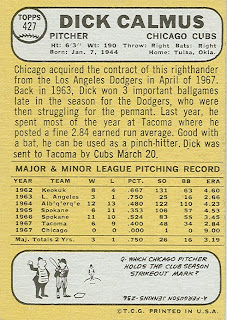After first appearing in the 1964 set as a Dodger, Dick Calmus (#427) dropped off Topps' radar for 3 years, but returned here for his final card. When I first got this card back in 1968, I thought he looked like a young Jack Kennedy!
Calmus was signed by the Dodgers in 1962. After playing 1 season of class-D ball, he spent the entire 1963 season with the Dodgers, appearing in 21 games (all but 1 in relief). He then spent the next 3 seasons in the Dodgers farm system, mostly as a starting pitcher. Calmus was at AA Albuquerque in 1964, and AAA Spokane in 1965 and 1966.
.jpg)
.jpg)
In late April 1967, he was traded to the Cubs for pitcher Fred Norman (who would go on to pitch many years with the Padres and Reds). Calmus spent the entire season at triple-A Tacoma, then made one appearance with the Cubs on September 2nd. It would be his last major-league game.
Dick would play in the minors for 2 more seasons: for the Cubs in 1968 and the Dodgers in 1969.
I wonder why he even has a card here in 1968, since he pitched a grand total of 4.1 innings in 1967, and none in 1968.
.jpg)
.jpg)
.jpg)
.jpg)


.jpg)


.jpg)


















